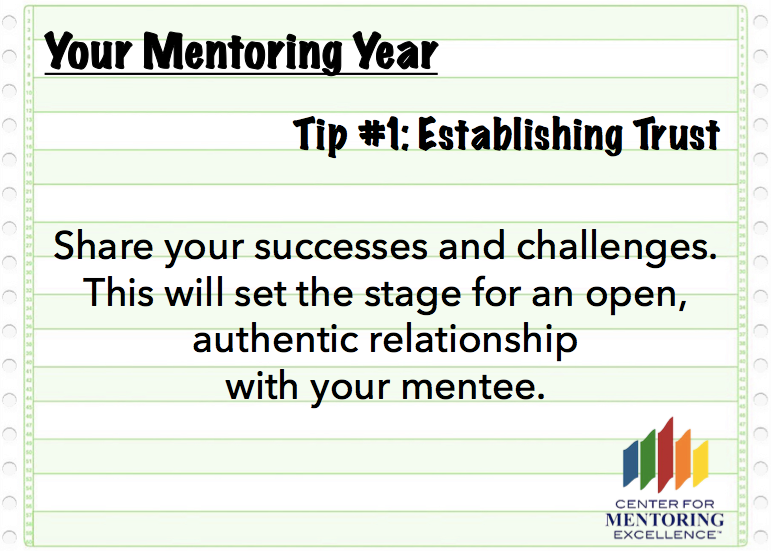
by Center for Mentoring Excellence | Apr 5, 2017 | Facilitating Learning, Growth and Development, Making Mentoring Work For You, Mentoring Communication, Mentoring Questions, Mentoring Relationships, Supporting Mentors and Mentees
Trust is everything when starting out in a new mentoring relationship — and even when you’re nurturing an existing one! While it’s tempting to dive in and drill down quickly to talk about needs and goals at the first meeting, try to avoid this. Instead, focus first on establishing an open and authentic relationship. It takes time and attention, but in the long run, it’s well worth it. You will have established a deeper, more meaningful, trusting relationship. Here are some things to keep in mind:
- Get to know your mentee, and let your mentee get to know you. To jump start the process, come prepared with a list of questions. What is it you want to know about your mentee as a person? What do you want to know about your mentee’s work context?
- Your mentee needs to relate to you, too. Mentees are more forthcoming when a mentor shares their personal success stories, as well as their struggles. If you’re open and authentic, it invites your mentee to be, too.
Check back soon for “Your Mentoring Year” Tip #2!

by Center for Mentoring Excellence | Aug 4, 2015 | Facilitating Learning, Making Mentoring Work For You, Mentoring Communication, Mentoring Relationships
“A story is the shortest distance between two people.”
— Pat Speith
Sharing personal stories, successes and challenges serves multiple purposes in a mentoring relationship.
- Stories build trust, keep a mentoring relationship real, create a comfort level, and give your mentee “permission” to share their own.
Hearing stories about your career and personal challenges provides a powerful impetus for mentees to take action.
- Your setbacks remind them that successful people do face and overcome roadblocks.
By sharing strategies for solving problems and dealing with adversity your mentee learns from your experience.
- According to psychologist Uri Hasson, “Anything you’ve experienced, you can get others to experience the same.” People accept ideas more readily when their minds are in story mode.
Telling your stories and sharing your learning demonstrates openness and respect, and builds trust.
- It creates points of connection, a shared language, and grist for ongoing conversation.
Your story motivates mentee self-reflection.
- It activates their brain cells, stimulates critical and creative thinking, and increases their self-awareness.

So, what is your story?
How can you tell it in such a way that it invites conversation, reflection and learning?
Encourage your mentees to share their stories by:
1. Sharing yours
2. Thinking, in advance, about what you really want to know about them
3. Asking specific questions to encourage them to reflect on their career path, specific experiences, previous successes, and work projects
4. Listening closely to what they say, how they say it, and the words they use to describe their experiences
5. Asking probing questions to encourage them to reflect on the lessons they have learned from their stories
by Center for Mentoring Excellence | Apr 29, 2010 | Uncategorized
Trust is a lot like a bank account. When you make regular deposits in it your balance builds up. When you make a withdrawal, you need to be sure that you have sufficient trust to cover the transaction. (more…)
by Center for Mentoring Excellence | Mar 10, 2010 | Uncategorized
The ability to build and maintain trust is critical to leadership success and the bedrock of a strong relationship.
Think about people that you feel the closest to. What is the trust level between you? How would you describe those interactions? (more…)





